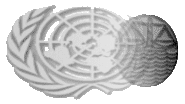
 |
UN Fish Stocks Agreement Review Conference
UN Headquarters, New York | 22-26 May 2006
| 
|
| |
|
|
|
Review Conference Addresses Monitoring, Control,
Surveillance, Compliance and Enforcement

On Wednesday, 24 May 2006, the Review Conference of the UN Fish Stocks
Agreement (UNFSA or the Agreement) reviewed and assessed implementation
of the Agreement's provisions on monitoring, control and
surveillance (MCS), and compliance and enforcement. The drafting committee
met in the morning and in the evening, to complete discussions on
conservation and management of fish stocks.
Above: President Balton's stuffed lion, Ponce de León, kept
watch over the gavel as Balton accompanied participants in their search
for consensus.
|
|
|
Wednesday, 24 May
|
|
Plenary
|

Lori Ridgeway, Canada, cautioned against producing a "timid outcome,"
recalling that, at recent high seas fisheries meetings, ministers had
rejected reforms that were seen as lacking boldness. She urged strong
policy debates in plenary.
|

Kjell Kristian Egge, Norway, suggested establishing a global legally
binding instrument involving all port States, based on the FAO model
Scheme on port State control.
|

Famoudou Magassouba, Guinea, suggested that access agreements include an
obligation for the fishing State to assist the coastal State with
surveillance and monitoring, and emphasized port State controls such as
vessel inspections and control of transshipments.
|

James Larsen, Australia, called for effective compliance and monitoring
by flag States including through using logbooks, Vessel Monitoring
Systems and observer records, and applying standards contained in UNCLOS
and the FAO Compliance Agreement, Code of Conduct on Responsible Fisheries
and International Plan of Action on Illegal, Unregulated and Unreported
fishing.
|

Serge Beslier, European Community, underscored the need for States to
evaluate on a regular basis sanctions applied at the national level, and
to exchange related information with other countries.
|

Joji Morishita, Japan, said he would cautiously consider a legally binding
instrument on port State control, but called for a balance between a
global, centralized approach and a targeted one.
|

William Gibbons-Fly, United States, noted that penalties imposed by many
States are often not sufficient to deter violations, but instead become
merely a cost of doing business.
|

Mozambique identified ratification of the Agreement as an important
priority.
|

Latifa El Haddad, Morocco, highlighted active cooperation among African
States, but lamented the general lack of resources. She stated Morocco's
intent to ratify the Agreement.
|

Papua New Guinea, on behalf of the Pacific Islands Forum, highlighted
the Forum's regional vessel monitoring system, a regional boarding and
inspection regime and a regional catch documentation scheme for the
Western and Central Pacific Tuna Commission, and called for RFMOs to
exchange information relating to fishing
registries and violations.
|

Ricardo Belmontes Acosta, Mexico, said that cooperative initiatives such
as observer coverage and market controls were preferable to inspection
and boarding, which should take place only with the consent of the flag State.
|

Tomas Heidar, Iceland, advocated that only States that comply with their
responsibilities regarding flagging fishing vessels should be permitted
to be considered flag States.
|

Karen Sack, Greenpeace, called for: a centralized MCS agency; a
blacklist of vessels that have disregarded laws; legislation preventing
transshipment at sea; and penalization of States that breach their
flag State duties.
|

Peter Prows, Palau, welcomed the vessel registration and monitoring
initiatives worked on by Australia and New Zealand.
|

Gina Bonne, Indian Ocean Commission, noted States' difficulties in MCS
activities due to limited resources and their vast exclusive economic zones.
|
|
Drafting Committee
|

In the morning, the drafting committee continued discussing the revised
draft text on conservation and management. Informal drafting on this
matter was undertaken during the day, with some text remaining bracketed.
In the evening, the drafting committee began consideration of draft text
on strengthening the substance and methods of implementation of the
Agreement's provisions on international cooperation and non-members.
|
|

